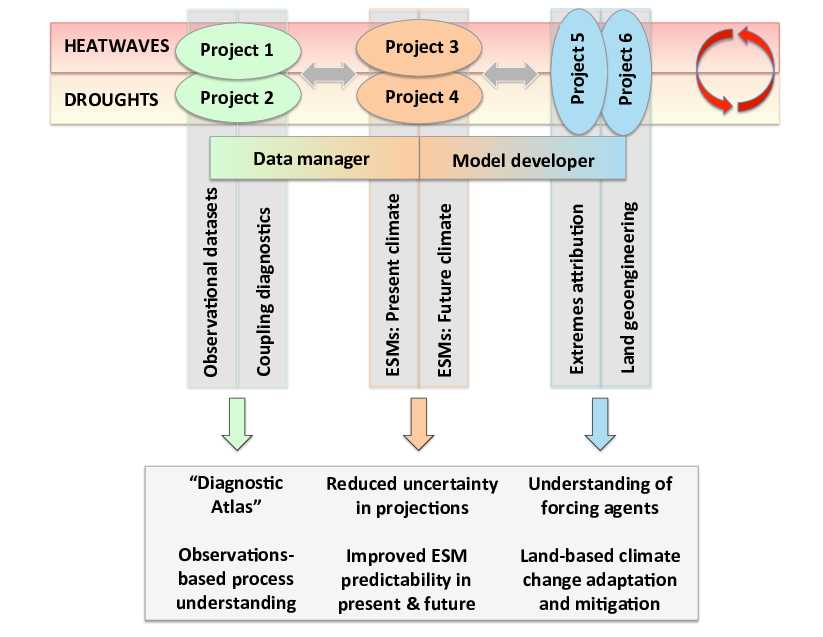Work packages
The DROUGHT-HEAT project is divided into three work packages (WPs)

Work Package 1
"Processes": Quantitative observational diagnostics
In this work package, we are deriving and identifying quantitative observational diagnostics and related datasets for relationships and feedbacks leading to droughts (Project 1) and heatwaves (Project 2), and related impacts (e.g. modified land carbon uptake). The DROUGHT-HEAT data manager is assisting the PhD students in their work, collects datasets, provides technical support for the analyses, and builds up and manages the project database. The main deliverables of this work package are as follows:
- An advanced understanding of the processes and feedbacks leading to droughts and heatwaves, and affecting their impacts on the climate system, based on observational data analyses.
- A consolidation of the gained knowledge through established observational diagnostics, quantifying the underlying relationships.
- The provision of datasets of the key identified diagnostics to the research community.
We will address the main following research questions:
- How sensitive are ecosystems to (soil moisture) drought, how do these relationships vary in space and time, and what are the resulting impacts on moisture, energy and carbon fluxes, and the atmosphere? (Project 1)
- How sensitive are temperature extremes to land surface conditions, including soil moisture levels, evaporative fraction, albedo and land cover type? (Project 2)
Work Package 2
"Earth system models": Constraints to reduce ESM uncertainties and biases
Projects 3 and 4 will directly build upon knowledge acquired in WP1. They are scheduled to start at Month 10, so that they can use initial diagnostics identified in the first year of Projects 1 and 2, and at the same time also provide feedback on best avenues to isolate observational diagnostics specifically suited to evaluating and constraining ESMs. Both Projects will combine own model experiments (with ESMs and LSMs, with support from the model developer) and analyses of multi-model experiments. They will focus on the following topics:
- Drought processes and drought-ecosystem feedbacks, including feedbacks to land water, energy and carbon fluxes, and the role of soil moisture-precipitation feedbacks (Project 3)
- Land surface-temperature feedbacks, considering effects from soil moisture, albedo, land use/land cover, soil types, and topography (Project 4)
The two PhD projects will address the following main questions:
- Evaluating ESMs and their LSMs for present-day climate: What are the main uncertainties and shortcomings of current ESMs, including shared biases, and underlying causes? Do current ESM-based seasonal forecasting systems correctly capture land-mediated predictability for droughts and heatwaves?
- Mapping between present-day behaviour and projections: What are the relevant diagnostics for predicting the future behaviour of drought and heat extremes, which are suitable for the application of observational constraints to ESMs? (In coordination with WP1 and WP3)
Work Package 3
"Frontier applications": Attribution of extremes to land processes and their mitigation through land geoengineering
Projects 5 and 6 will focus on frontier modelling applications. The main modelling tools will be the regional ESM COSMO-CLM2 and – at the global scale – the NCAR and MPI Earth System Models. The PhD projects will benefit from the model developments undertaken in WP2 and will receive technical support from the model developer. They will address the following scientific questions:
- Assessment of role of land-climate interactions for recent drought and heatwaves, as well as trends in these events with implications for climate change attribution (Project 5)
- Testing and assessment of land-geoengineering options to mitigate the effects of droughts and heatwaves on both regional and global scale using improved modelling systems (Project 6)
These topics constitute leading-edge research applications, which are moreover important contributions to climate change adaptation and mitigation through public communication (attribution) and the reduction of impacts of unavoidable climate change (land geoengineering). The activities in projects 5 and 6 will benefit from existing collaborations with several institutions.